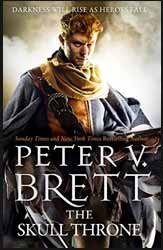|
Click here to return to the main site. Book Review
When Ahmann Jadir, the man destined to unite the tribes and push back the invasion of demons, is lost during a duel, the skull throne loses its ruler. In a court where intrigue and power plays are not uncommon this sudden vacancy creates a power vacuum which threatens to tear society apart. Unsure whether her husband is dead, Jardir's first wife, Inevera, must move quickly to secure a successor as a caretaker ruler, whilst at the same time stopping either of her two sons making a bid for the crown, killing each other in the process... The Skull Throne is a continuation of the fantasy series from author Peter V. Brett. I am probably not the right person to review this weighty tome as it ticks just about everything I dislike about some of the fantasy genre. Brett presents a world at war with both a demon invasion and themselves. Much of the book is spent in the company of the Krasians, a divided people, only really held together in their belief that Jardir is some form of messianic leader. In their theocracy, women are not valued much, husbands are allowed to beat their wives and most high offices are banned from them completely. For the most part the males act in a misogynistic manner which is socially acceptable. The book opens with a quick recap of the fight between Jadir and Arlen Bales, culminating with the two of them falling off a cliff; it’s not a spoiler as you really shouldn’t start the series with book three. Obviously as the lynch pins of the Deliverer prophecy, it’s not giving much away to say that both survive, one wedded to a humanistic point of view, whilst the other is convinced that he is literally a messenger from God. This sounded interesting; however fans of these two characters should be aware that they appear very little in the unfolding story. My real issue with the book (and this is purely personal; not having read the first two and invested in the world building, is the language). There is an old adage that, regardless how far in the past or future you set your novel, if people are drinking a warm brown liquid there a good chance that it is coffee, so don’t feel the need to make up a word, just call it coffee. Brett has created a whole social structure, seemingly not dissimilar to an Islamic state, where every social standing has a word of its own, whether it is the ‘Damaji’, the ‘Alagai’ or ‘Shar’Dama Ka’. This is just a small sample of the names and designations which liberally pepper the text and which for some unknown reason have to be in italics. Unfortunately, I found the language distanced me from the story and its continued use kept popping me back out of the world. I’m guessing, as there was no appendix explaining what all of these mean, that they had been explained in earlier books. If not, I’m not sure how Brett expected any reader to wade through the unnecessary waffle. I can’t help but feel that a bit of judicious editing would have made the book more accessible and more interesting. It does contain some great passages and scenes, but also some unnecessary one, like Ashia’s flashback chapter, probably a boon for long standing fans, but it did little to move the plot along. If you’re into political intrigue or a fan of the first two books then this is for you, but I wouldn’t suggest that any casual reader start the series here. 7 Charles Packer Buy this item online
|
|---|


